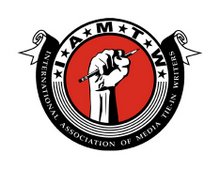There's a symbiotic relationship between books and films. The movie business likes to use books for content and cut their risks by relying on pre-sold characters and stories. The book biz likes to use movies as big-budget commercials for their products and piggyback on the huge promotional effort that surrounds new films and TV shows. But as the December issue of Moving Pictures magazine points out, there are some dangers. In one article, headlined "Sin or Synergy," the magazine discusses the recent surge in alliances between publishers and studios...many of whom are owned by the same parent companies. But that doesn't guarantee hits...for either studios or booksellers.
Maria Campbell, a highly regarded book scout for Warner Brothers, believes "good movies are made because people are passionate about them and have a vision. Alliances can create conversations, but they can't create good movies.
Ron Bernstein, head of the West Coast Book Department at ICM shares Campbell's caution. "Books will always be part of the landscape, but it's certainly not the glory days. With movies based on video games, remakes and TV series, the extraordinary hold that the printed word had on movies is not what it once was."
It works the other way, too. Books based on movies -- also known as tie-ins and novelizations -- aren't the booming business they once were, either. The short window between the theatrical release of a movie and it's availability in DVD has cut down on the need to buy a tie-in novel to re-live the movie experience. Why re-live it when you can own it?
In an article headlined "Novelization is a Nasty Word," the magazine also explores the publishing industry's continuing practice of turning movies into books. Among the authors they interview is Max Allan Collins, who they dub the "Leonardo da Vinci of pop culture fiction," co-founder with Lee Goldberg of the International Association of Media Tie-in Writers. "Novelization is an unfortunate term that tends to diminish the process or, anyway, the end result," Max told them.
Max and Greg Cox do a good job describing in the article the enormous obstacles confronting writers of novelizations...including ever-changing scripts, insanely short deadlines (two weeks to three months) and bad pay. Not to mention lack of respect.
Cox points out [that] novelizers almost never get to see the movie in advance. All they have to work with is an early draft of the script.
"If you're lucky," he says, "you get a stack of still photos and maybe a copy of the movie trailer. "
But when a novelization scores, it can score big. Max's adaptation of SAVING PRIVATE RYAN sold over a million copies in the U.S. alone. And when a movie does well, the book it was based on reaps the benefits -- according to the magazine, the tie-in reprint of the DA VINCI CODE, with Tom Hanks on the cover, sold five million copies.
Regardless of the potential for these partnerships, the business still remains driven by agents, writers, and studio execs who have to read the material and get excited by it. As Maria Campbell observes, "it takes a village to publish a book. It takes a continent to make a movie."








No comments:
Post a Comment